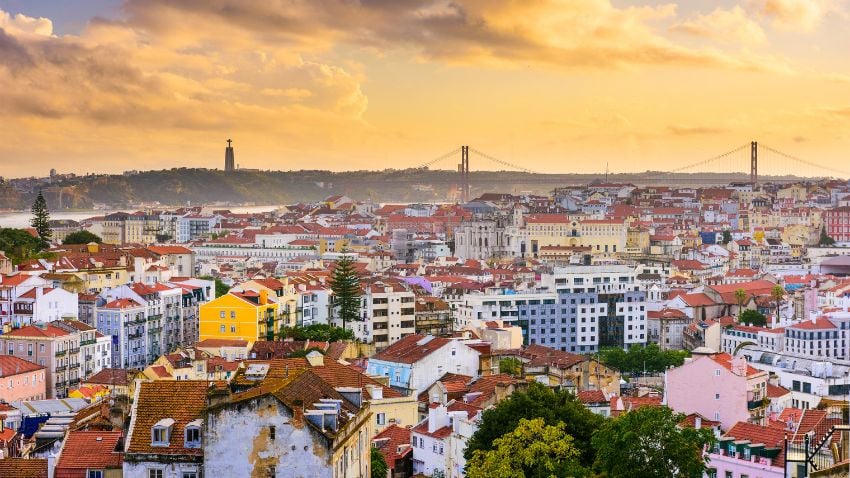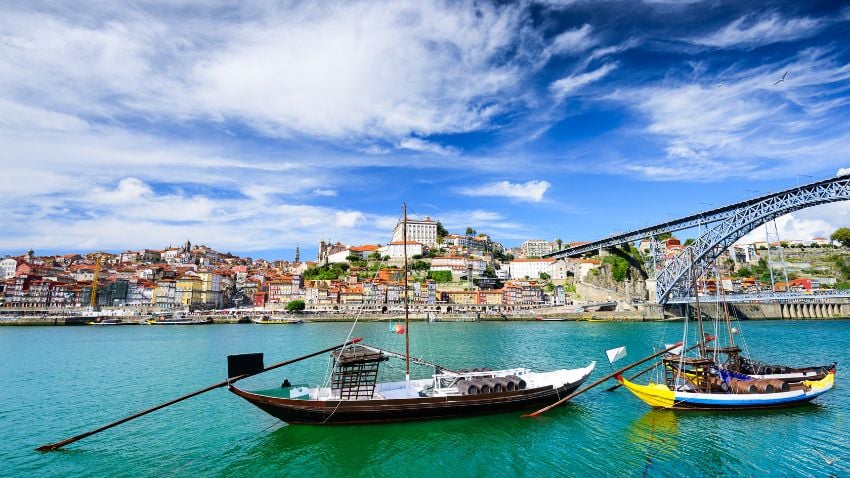Best Cities To Live In Mexico In 2026
Mexico remains one of Latin America’s most compelling destinations, especially for North Americans. More than a million expats call it home, and tens...

5 min read
You might consider Southern European countries fantastic holiday destinations. But also terrible places to work due to their astronomical taxes. Indeed, countries such as Greece, Spain, Italy, and Portugal have public debts well over 100%, and governments still have ambitious spending plans that would further exacerbate this problem. The average citizen is forced to pay for lousy government decisions made even before 2020. To illustrate this, take the example of Spain, where you would pay at least a 45% tax if you make more than €60,000 ($64,929 USD).
Although many politicians consider increasing taxes the solution to alleviate government debt, the reality is quite the opposite. Countries such as Argentina have proven that this policy can be counterproductive. Another consequence is the rise of the informal economy. The Portuguese and Spanish governments have been very close ideologically, and the socialist party is indeed prevalent in each of these countries.
However, Portugal has developed a new update to its Non-Habitual Resident (NHR) tax regime. This could be a blessing for those who like to live in a country with great food, a low cost of living, and good weather throughout the year. As an expat, you could enjoy all these benefits combined with sensational tax incentives. Keep reading to find out more.

There is no minimum stay requirement for the NHR Program in Portugal
Like Greece, the Portuguese government intends to attract talent and foreign investment to decrease public debt and boost the economy. You are eligible for reduced taxes and exemptions as a foreign resident or investor. The program has been active since 2009, was updated for the last time in 2020, and has attracted over 10,000 foreigners so far. Here are some reasons to consider this tax regime:
These benefits are a breath of fresh air given the current state of most Western tax authorities. However, let us examine the eligibility criteria to see if you can apply for this program.
Related content: The Basics Of How To Get A Second Passport Or A Second Residency

Portugal might be a good place to develop your professional career
You must meet specific requirements to become a non-habitual resident (NHR).
You cannot have been a tax resident in Portugal during the five years before applying.
You must have the right to be a long-time resident of the country. For example, if you are a citizen of the EU, EEA or Switzerland. In that case, you do not need extra visas since your passport, European Healthcare Insurance Card (EHIC) card, and current address suffice. Otherwise, you would need a Visa such as the Portugal Golden Visa or the D7 Visa.
You must have a place of abode in Portugal by the 31st of December that year. Although you can buy a property, renting a house for a whole year will be enough. Ensure you have the proper documentation to prove you will live in the country for 12 months. Then, you must apply for the NHR status before the 31st of March of the following year.
After meeting these requirements, you can get the 20% income tax if you work on any of these high-value activities, which, as you will see, are of an artistic, cultural, scientific or technical nature. Some of these professions are:
Architects
University professors
Archeologists.
Actors.
Musicians.
Painters.
STEM positions such as mathematician, engineer, programmer, etc.
Biologists.
Designers.
Tax consultants.
Dentists.
Note that as a professional in the high-value occupation category, you will need to hold a level 4 qualification under The European Qualifications Framework, a level 35 of the International Standard Classification of Education or five years of proven professional experience. If you meet these requirements, Portugal might be a good place to develop your career with generous tax benefits and exemptions. Moreover, the flat tax rate also applies to freelancers whose activities are deemed high-value.

You can have a differentiated tax regime because of the Non-Habitual Resident Program
If your employer is from another country, you will pay taxes only in that country and not in Portugal as long as there is a double taxation agreement. See the list of countries here. The same applies to dividends, royalties, interest, capital gains and rental income outside of Portugal. Moreover, if your job is high-value and your income originates in Portugal, you can benefit from the flat tax rate of 20%.
If you are a freelancer belonging to high-value categories and your earnings come from a country with a Double Taxation Agreement (DTA) with Portugal, you can also benefit from the 20% rate. Keep in mind that if your job does not belong to the eligible professions list, you will be taxed at a standard progressive rate of up to 48%.
To get tax-free income through royalties, capital gains and Real Estate, there must be a Double Taxation Agreement in place between the country and Portugal, or at least the country is not considered a tax haven. Otherwise, royalties and capital gains from securities will be taxed at a rate of 28% or 35% if it originates in a blacklisted tax haven. You pay a flat tax of 10% on overseas pensions, and you will pay no tax in the state of source.

Residing in Portugal allows you to enjoy the famous Douro River, in Lisbon
As long as your profession is high-value, you will benefit from the 20% rate or the standard progressive rate if it is below 20%. As a freelancer, the same principle applies. You either must pay a 28% optional rate or standard progressive rates on rental income. On net capital gains, you pay a 50% rate. A pension will be subjected to standard taxes.
Get your residency Visa. If you are a citizen from a country outside of the EU, EAA or Switzerland, you need to get a residency Visa such as the Golden Visa, D3 Visa, D2 Visa or the D7. Every procedure must be done with a Portuguese embassy in your country of origin or with the “Serviço de Estrangeiros e Fronteiras” (Service of Foreigners and Borders). Otherwise, you can apply for residency at a local town hall (Sítio da Câmara in Portuguese). As mentioned before, bring your passport, European Healthcare Insurance Card and your current address. In the town hall, you will need to register as a “Cidadão Europeu” (European citizen) and pay a fee of under €20 ($22 USD).
Get your tax identification number (Número de Identificação Fiscal, NIF), which consists of 9 digits. The easiest way is to get this in Portugal. If you are in the country, bring your passport, proof of residence (e.g. a rental contract or a utility bill) and residency certificate or Visa to the local government finance office (finaças). If you can’t travel to Portugal, you can contact us. We can help you communicate with the Portuguese Tax Authorities on your behalf. You can also use sites where you could pay under €100 ($108 USD) to obtain the NIF.
Register as a tax resident. This step is also done at “Finanças.” To become a tax resident, you can meet requirements such as remaining in the country for over 183 days, whether consecutive or not, within a year or even having a place of abode you plan to use as your habitual residence.
Apply for the NHR status. Use the official financial portal and register on the website. When registering, you will have to provide your NIF, mail, phone number, fiscal address (Morada fiscal), and even a secret question with an answer. In at most two weeks, you should receive a password by post.
Then, you can access the financial portal and register for the NHR program. You access “Aceda aos Serviços Tributários” click on “Entregar Pedido” and “Inscrição Residente Não Habitual." You will need to submit three documents:
Proof of purchase or rental contract.
Tax returns for the past five years.
A declaration that states you have not been a tax resident in Portugal for the past five years. It is highly recommended to show that you have been a tax resident in a different country.

While in Portugal, you can visit Obidos, the stonewalled city
Portugal might not be the perfect place for doing business. Still, as a high-value worker or freelancer in any of the selected categories, you will benefit from multiple tax exemptions that will keep more money in your pockets for ten years. On top of that, remember that this is a crypto-friendly country for digital nomads, so if you are an investor or can work anywhere in the world, becoming a Non-Habitual Resident in Portugal might be a good choice.
Although you are not obliged to stay in the country, you will be able to enjoy good weather, delicious gastronomy and overall safety. With all these benefits, some of which go beyond tax (e.g. freedom of movement in multiple countries), the NHR program could be a great stepping stone to reaching more ambitious levels of financial independence.
If you want the best intel from the expat world, including profitable offshore opportunities, little-known tax-saving strategies, and hard-won insights on immigration, passports, and Plan-B residencies, all delivered to your inbox every single week, then join our daily correspondence, EMS Pulse®. Currently enjoyed by over 84,000 expats and expat-hopefuls worldwide. Fill in the form below to join our newsletter free:

Written by Mikkel Thorup
Mikkel Thorup is the world’s most sought-after expat consultant. He focuses on helping high-net-worth private clients to legally mitigate tax liabilities, obtain a second residency and citizenship, and assemble a portfolio of foreign investments including international real estate, timber plantations, agricultural land and other hard-money tangible assets. Mikkel is the Founder and CEO at Expat Money®, a private consulting firm started in 2017. He hosts the popular weekly podcast, the Expat Money Show, and wrote the definitive #1-Best Selling book Expat Secrets - How To Pay Zero Taxes, Live Overseas And Make Giant Piles Of Money, and his second book: Expats Guide On Moving To Mexico.

Mexico remains one of Latin America’s most compelling destinations, especially for North Americans. More than a million expats call it home, and tens...

South Korea is far more than K-pop and K-dramas. It is a country known for outstanding food, from bustling street markets to high-end dining, as well...

Asia is one of the most fascinating regions in the world for travel, offering an extraordinary mix of cultures, histories, and landscapes. From...